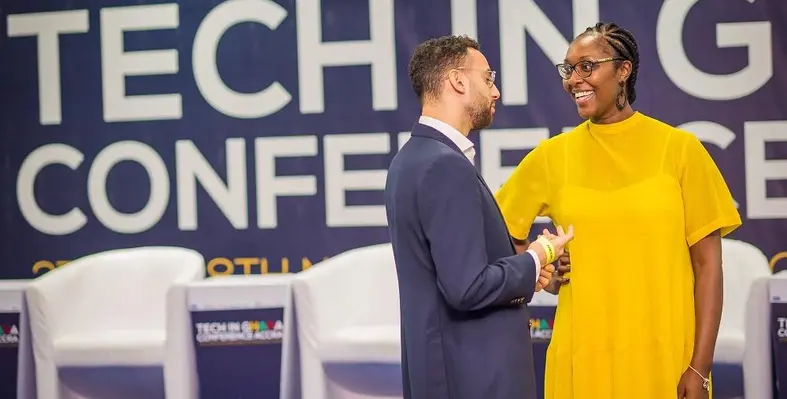Akosua Annobil, founder of AB2020 and Tech in Ghana, talks about her work in connecting high-level government stakeholders and tech businesses to help build the country’s future
It was while working on her communications and events platform AB2020, promoting and connecting businesses globally, that Akosua Annobil saw a gap in the tech sector in Ghana and launched the Tech in Ghana conference. It has become her company's flagship event, which takes place twice a year in Accra and London, bringing high-level government stakeholders together with tech entrepreneurs and companies in Ghana and the UK.
Fast forward two years, and the conference has become the must-attend event for tech businesses in both countries – and her work has not gone unnoticed. The fifth Tech in Ghana is due to take place on 10 June as an official part of London Tech Week – Europe’s leading technology and start-up festival.
How are you feeling about Tech in Ghana conference in June?
We’re very excited to be a part of London Tech Week, which will be in line with Tech in Ghana's 2019 theme of Connecting Our Global Networks: People, Opportunities and Industries. I’m expecting a great response from participants. We’ll then be back in Accra for our sixth event and learning expedition in November.
Last year, you were recognised in the Financial Times top 100 list of most influential Black, Asian Minority Ethnic (BAME) leaders in the UK tech sector. What was that like?
It was a huge honour to be recognised by the Financial Times as it’s a publication I admired and did a work experience placement for in my teenage years. I was very surprised about the response I received from people and those who shared the news across their networks. It made me excited about the future, and how this kind of recognition can help build Tech in Ghana into an even bigger platform and create more value for participants.
How successful was the fourth edition of the Tech in Ghana conference in Accra on 27 and 28 November, 2018?
It went really well. It was our fourth conference, and opened by the Deputy Minister for Communications, Hon. Vincent Sowah Odotei. Around 300 local and global companies, entrepreneurs, high-level government stakeholders and students attended over the two days. It delved in to some interesting key sectors building and the tech incubators that are helping to build start-up companies. We were very deliberate in giving the platform to tech is going on across the nation and not just in the capital, which was very insightful for the audience.
It’s rare to get the various stakeholders, government representatives plus the private sector and start-up community in one room, learning about how they can collaborate better or at least hear from each other. It showed how Tech in Ghana is playing a huge part in building relationships within the ecosystem.
How did it compare to other conferences?
We had more students. Again, this was very deliberate because we were keen to share information with the next generation. We had students from Ashesi and Lancaster Universities in which we are finding very talented young students from Ashesi and Lancaster Universities in which we are finding very talented young people who are creating solutions to local problems.
Some are even building world-class technology and this is getting overlooked so we were able to introduce them to entrepreneurs who have been there and done it. We are really keen to make sure they have a chance to showcase their work and get feedback, which can be really powerful.
Tell us more about one of the conference's 'connecting the unconnected' theme.
‘Connecting the unconnected’ is a theme we highlight in all of our events. While there is great stuff happening in tech, there are also rural communities and underprivileged individuals that could be left behind if we’re not mindful. We therefore like to explore how technology is helping to provide learning resources, useful data and services to those living in remote areas and in 'last mile’ communities.
Who attended the conference?
Speakers ranged from corporates and government agencies; such as the office of the vice president, MTN (Ghana’s biggest telco), Stanbic Bank and the National Information Technology Agency (NITA); to fast-growing local companies including Farmerline, eCampus, Kudigo and Cowtribe. Contributions also came from tech and entrepreneurship hubs iSpace, Meltwater Entrepreneurial School of Technology (MEST), Kumasi Hive and our event host the Accra Digital Centre among others. Meanwhile, keynote presentations included people like Andrew TakyiAppiah, the founder of Zeepay − one of Ghana’s most popular fintech companies that recently did a deal with Moneygram; Yofi Grant, CEO of the Ghana Investment Promotion Centre, who talked about how they’re positioning tech as a priority investment.
We paid tribute to the late Ghanaian diplomat Kofi Annan and had a representative from the Kofi Annan ICT Centre of Excellence, which is based in Accra, talk about Mr Annan’s legacy, vision and their future plans for the centre. It was a really insightful two days and confirmed support with connecting these stakeholders in between our events.
Keep an eye on TechInGhanaConference.com for further updates.












